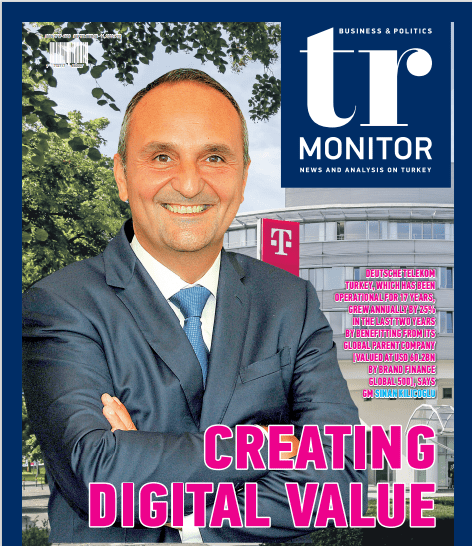BY DIDEM ERYAR UNLU
Deutsche Telekom, one of the world’s leading telecom companies, broke a new record by increasing its brand value by 18% from USD 51.1bn the previous year to USD 60.2bn last year. This rise has made Deutsche Telekom rank second among the world’s most valuable brands on the Brand Finance Global 500 list. Benefitting from this valuable brand, Deutsche Telekom Turkey achieved significant growth with an annual increase of 25% in the last two years, according to GM Sinan Kilicoglu.
Operating in Turkey for 17 years, Deutsche Telekom offers technology solutions to Turkey’s most valuable institutions. “We are getting ready to undertake much larger projects with our business partners with the introduction of 5G mobile technologies in Turkey,” said Kilicoglu in an exclusive interview on the transformation in the sector and the plans of the company.
Deutsche Telekom started its operations in Turkey as telecommunication and licensed service provider 17 years ago. The company has translated this into slightly more manageable services since the mid-2010s. In 2015, they thought that future digitalization needs would pave the way for companies to receive more value-added services from professional service providers. “That’s why we started investing in these manageable services,” said Kilicoglu adding that value-added services shine among them, mainly security management, business network management, correlation tours management, systems management, ESP management, and end-user support.
Deutsche Telekom has become a company that serves the entire value-added chain. “As we are faced with different competitors when telecom, IT or services are involved, we think that we are the only company that can provide these services in terms of both telecommunication and IT,” noted Kilicoglu.
NAME CHANGE IN 2020
Deutsche Telekom went through a transformation at the beginning of the pandemic. The general structure of the group consists of three main groups: Mobile services that serve 250 million subscribers worldwide under T-Mobile; Fix Network, where they serve to 50-million home users mostly in Europe and Eastern Europe; T-Systems, with which they serve corporate customers. The company used to operate in Turkey with its T-Systems brand. The company changed its name to Deutsche Telekom in Turkey in 2020.
“With digitalization, we decided to move to what we call the four main blocks,” said Kilicoglu. “One of them is the link. If you are already living in the digital world, you must be connecting. There, too, our goal is not to stop until everyone is connected. So, at the end of the day, not only people but also objects will be connected. Therefore, connectivity is essential,” he detailed.
Kilicoglu defined the second block as cloud computing, which helps people to collect the data created with this connection in one place. “In the third part, we need to provide some services related to the internet of things. The fourth part is also called connection. Cloud and IT services are all open to the outside world. Therefore, it is also open to attacks from the outside world. So, it needs to be managed safely,” he explained.
Cyber security sits on the four main blocks of the company, according to Kilicoglu. “This is what we refer to as the old T-Systems. With the 5G required by the digital world, we will begin to see a much different world. Security is
already a must. Data must be collected in one place,” he said. In this structure, four different brands were formed in Turkey: T- Systems, DT security, DT ITK, and other is the connectivity part they call DT Global
‘DIGITALIZATION IS NOT FIXING INFRASTRUCTURE
Companies need to create different business styles and values by using digital technologies, such as the internet of things, big data, and cloud technologies, Kilicoglu said. “They need to touch their customers by using these technologies more and creating more added value. This is true for digital transformation. Otherwise, there is no point in saying you fixed your infrastructure. All institutions need to change their way of doing business by using digital technologies,” he added.
Kilicoglu cited e-commerce, which has reached a very different level during the pandemic period. “Today, if small and medium enterprises (SMEs) do not know these technologies and do not take part in those platforms, it will become more difficult for them to sell their products. They will disappear in time if they do not communicate with their customers while exporting to the outside world using this technology,” he said. Therefore, every company should prepare itself for this, he added.
AUTOMOTIVE SUB-INDUSTRY TO INVOLVE SOFTWARE
Automotive is one of the sectors that Deutsche Telekom Turkey is closely interested in. Autonomous driving, for which tests have begun, will come into play very seriously in the next 10 years, according to GM Sinan Kilicoglu. “There will be a fuel-free structure with electric vehicles. Therefore, we foresee the formation of such an ecosystem there. We saw the ConnectedDrive concept at T-Gallery [a future forum at the company’s headquarters in Bonn where the telecommunications solutions of the future can be experienced] 10 years ago,” he noted and defined the ecosystem it will evolve into: “Normally, all the added value of the automotive industry is received by vehicle manufacturers and sub-industry manufacturers. But in the coming period, vehicles will become a platform as vehicles are connected to the outside world. You should be building a software-based ecosystem around this platform. In other words, the software industry will be a part of the automotive sub-industry.”
Therefore, he values Turkey’s Automobile Joint Venture Group Inc. (TOGG) as a very important project. “At the end of the day, it is not important to produce the vehicle, it will become very important to be in that ecosystem and to have that know-how. When we look at it from the perspective of our country, I think this is a very good investment,” he commented.
A CLEAR STRATEGY FOR TOUGH TIMES
Kilicoglu also underlined the economically troubled period that the whole world is going through. To him, a company can’t take precautions against what is happening in the world. “We just need to focus on doing our core job properly to manage it through somehow in this period without taking too much risk,” he said. Deutsche Telekom has a very clear strategy in this sense, he added. This economic situation may delay the investments a little longer, according to him. “Problems continue not only in the economic situation but also in the supply chain, for which we have to be prepared. For the first time, we are living in a period where external factors cannot be controlled and affect our business. But if you have a clear strategy and continue with that focus, you are likely to come out of this period very strong and growing,” he noted.
CYBER SECURITY A TOP PRIORITY
Cyber security has been on the agenda for the last two years and will be one of the most talked about topics in the coming period, according to Deutsche Telekom Turkey General Manager Sinan Kilicoglu. “When we look at Turkey specifically, we always talk about cyber security no matter which customer we go to. In this period, no company has not been attacked,” he warned.
WE NEED A COMPETENT WORKFORCE: KILICOGLU
“Digital transformation presents both an opportunity and a threat for every country. If you read the conjuncture well and prepare accordingly, this is an opportunity, but if you do not perceive it well, it is a threat. You should even be reorganizing your entire education system accordingly. In other words, the growing generation should be trained competently in digital technologies. We are an exporting country, but we are an importbased exporting country. This means that we do not create muchadded value. The parts that we will create the main added value will be coming in this coming period.
For that, we need to be prepared. Positive steps have been taken. There is a digital transformation roadmap by the Presidential Digital Transformation Office, which is making good strides on this. The industry and the government should do this together. The most important issue here is to be able to raise good human resources and keep them within the country.”











